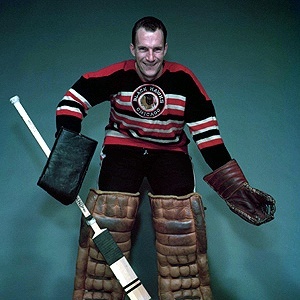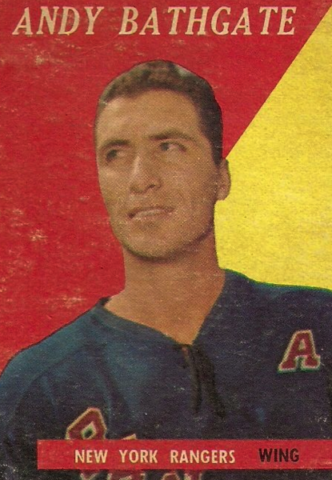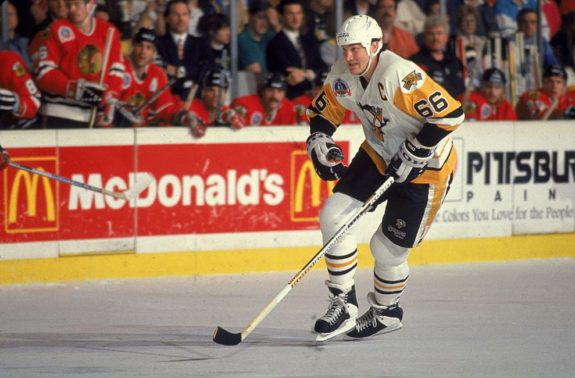The Hart Memorial Trophy is awarded “to the player adjudged to be the most valuable to his team” during the regular season each year as voted by the Professional Hockey Writers’ Association. The award has been given out since 1924, and 94 of the 97 choices over that time span have played for teams that qualified for the postseason. However, Al Rollins (Chicago Blackhawks), Andy Bathgate (New York Rangers), and Mario Lemieux (Pittsburgh Penguins) are the three select cases of players who received the award despite their teams falling short of the postseason.
Al Rollins- Chicago Blackhawks, 1954

As quite possibly the most peculiar NHL award recipient ever, goaltender Al Rollins won the Hart following the 1953-54 season. The Blackhawks finished dead last in the six-team NHL field with 31 points, while the New York Rangers finished in fifth with 68 points. They allowed the most goals in the NHL and scored the fewest.
Prominent stars Gordie Howe, Maurice Richard, and Red Kelly all posted solid seasons for playoff teams. Rollins finished with the worst goals against average (GAA) among regular starters and the most losses by a considerable margin. However, he stood between the pipes for all 12 of Chicago’s victories, five of which were shutouts. His persistent efforts for a dismal team earned him what hockey historian Stan Fischler would later refer to as the “Most Valiant Player” award.
Andy Bathgate- New York Rangers, 1959

Andy Bathgate tallied 40 goals and 48 assists in 70 games on the right wing for the Rangers during the 1958-59 season. Both were franchise records, and Bathgate’s personal best career point total earned him the Hart. Dickie Moore of the first place and eventual Stanley Cup champion Montreal Canadiens set an NHL record with 96 points during the regular season, yet he finished fifth in the Hart voting.
The Rangers were primed to clinch a postseason berth for the majority of the season, but a late-season slump, coupled with an incredible surge by the Toronto Maple Leafs, knocked them out of the fourth and final playoff spot. Bathgate was the second player in six years to win the Hart for a non-playoff team, indicating a voting trend during the 1950s that hasn’t continued into the modern era.
Mario Lemieux- Pittsburgh Penguins, 1988
Lemieux won his first of three career Harts at age 22 after the conclusion of the 1987-88 season. He finished with 168 points in 77 games. His point total was more than double that of Pittsburgh’s second-leading scorer, Dan Quinn. The Penguins missed the 1988 Playoffs by one point. It was the sixth consecutive season they failed to qualify, but the spectacular play of their young and promising star center provided hope for a new era.

Wayne Gretzky had won the Hart in eight consecutive seasons previously, but he was limited to 64 games for the Edmonton Oilers in 1987-88. His streak of seven consecutive Art Ross Trophies as the NHL’s top point scorer also came to an end. Lemieux outscored Gretzky by 19, announcing the arrival of a second generational talent and a player that could finally provide a little bit of competition for “The Great One” in the coming years.
Hart Trophy Debate
The Hart Trophy hasn’t been awarded to a player from a non-playoff team in 33 years, partly because of debates surrounding the award’s criteria. The subjective nature of a player’s value to his team leaves room for gray areas that enter discussions every time a player demonstrates himself as a worthy candidate without enough help surrounding him to make a playoff push. Like in the case of players who lose the Stanley Cup Final earning the Conn Smythe Trophy, many voters will avoid selecting a Hart winner from a non-playoff team unless the player is truly exceptional rather than just the most valuable in a given year.
Jarome Iginla, at 24 years old in 2002, finished second in Hart Trophy voting. He stood out despite a considerable lack of reputable NHL talent surrounding him on a Calgary Flames team that missed the playoffs. He led the league in goals with 52 and points with 96, while the second-place finishers totaled 41 and 90, respectively. Connor McDavid reignited the debate with a hot streak late in the 2017-18 season. The Oilers finished 16 points out of a playoff spot that season, and he ultimately finished fifth in the Hart voting. All four players who finished ahead of him played for teams who made the postseason.
The lack of substantial historical precedent also makes voter decisions more complex. Given the unlike comparisons of both Rollins and Bathgate during the 1950s to modern NHL players, Lemieux’s 1987-88 campaign is the only case that should be taken into legitimate consideration in the present day. Given the 33-year lapse, it is fair to wonder if this novelty will ever occur again.